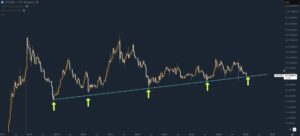The short-lived battle between Sam-Bankman Freed and Binance CEO CZ has revealed that one emperor had no clothes. The long-term impact in terms of trust, regulation and institutional flows has yet to be determined, but this turn of events is embarrassing for everyone in the industry.
Days after a Coindesk report revealed that around 40% of the firm’s $14.6 billion of assets were attributed to FTT, the token that powers trades on FTX, a run on the exchange started.
Solana (SOL), which was backed by SBF, accounted for around 8% of Alameda’s assets. Alameda’s CEO Caroline Ellison rebuffed claims that the firm was approaching insolvency, saying that the leaked balance sheet did not encompass the full scope of Alameda’s assets.
Later on, Zhao tweeted he would liquidate Binance’s substantial FTT holdings.
As part of Binance’s exit from FTX equity last year, Binance received roughly $2.1 billion USD equivalent in cash (BUSD and FTT). Due to recent revelations that have came to light, we have decided to liquidate any remaining FTT on our books. 1/4
— CZ 🔶 Binance (@cz_binance) November 6, 2022
At the time (8 Nov.), FTT was trading at $14.65 at 6:00 am CET, down about 36% in 24 hours. FTT then soared following the disclosure that Binance would take-over FTX, reaching $18.50 by 8:00 am CET.
Solana, which was at $27.60 at 17:00 CET — down about 18% since yesterday — went up to $30.36 a half hour later.
The rally was short-lived. FTT lost 86% of its value since the (letter of intent) LOI, trading at $4.3 at 14:00 CET. Meanwhile, Solana has lost 53% of its value, reaching $14.9 before witnessing a relief bounce.
Cryptocurrencies aren’t going away. Buy Bitcoin & Litecoin here.
In the last 24 hours, $865 million liquidations took place, with the largest liquidations occurring on Binance ($6.7 million). According to research from data aggregator CryptoQuant, the crypto market saw the biggest long liquidation cascade event since the Luna crash. Open interest is down 35% since its October highs.
Yesterday was the biggest longs liquidation event since the luna crash🚨
“Open interest is down about 35% from its October highs, returning to June levels this year, leverage stack built up over the past 5 months has been removed.”
by @caueconomy— CryptoQuant.com (@cryptoquant_com) November 9, 2022
Long-term impact
FTX practiced fractional reserve banking and used a token it created as collateral, ultimately paving the path for its demise. FTX was second to Binance in size – considered by many to be making inroads into both the regulatory and institutional investment arena. The highly contentious SBF-backed DCCPA bill which sought to enlarge its scope to regulate DeFi GUIs will probably be put on hold for the time being (if not entirely scrapped).
Regardless, contagion effects have yet to be hashed out. Institutional banks which used FTX will be affected and the reputational blow to the industry has yet to be quantified. It gets worse. Sam Bankman Freed deleted a tweet where he stated that client assets are fully backed hours before the exchange revealed it is insolvent.
This is embarrassing. https://t.co/MPkGQx7kcE
— Chris on crUPto (@ChrisOnCrypto1) November 9, 2022
One silver lining is the well-received call for crypto exchanges to adopt a ‘proof-of-reserves‘ standard. Such an initiative is a step in the right direction which would help mitigate a heavy-handed regulatory approach. As noted by Coinbase CEO Brian Armstrong on the Bankless podcast’s live coverage, serious exchanges must have excess capital reserves precisely because of bank runs. Transparency reports like those from Bitfinex-Tether are also a step in the right direction.
No doubt, there will be ongoing investigations on the short-lived saga. Institutions which funded FTX’s series B like BlackRock, Tiger Global, Temasek, Sequoia, VanEck, and the Ontario Teachers Pension Plan are now dealing with the fact that crypto’s ‘most trust-worthy’ entrepreneur is not trustworthy.
Meanwhile, the market must digest the fallout and liquidity crunch. While OG coins like Bitcoin, Litecoin and Ethereum will weather any storm and potentially rebound into year-end, alternative coins without a track-record or real use-case (besides voting rights) may suffer immensely due to this blanket breakdown in trust. Oddly enough, this event partly brings the industry ‘full circle’ back to censorship resistant, trustless sound money. But it also highlights the dangers of over-reliance on centralised exchanges, and the need for decentralised finance and DEXs.
The concentration of power into the hands of one man is cause for concern. Binance now dominates both the spot and derivatives market, and regardless of whether the letter of intent for FTX’s acquisition (LOI) goes through (update: LOI did not go through), users will seek other platforms. FTX had a $6 billion hole in its finances when prices began to tumble. That number is larger now.
Bitcoin is down about 72% from its all-time high reached last November. It had rebounded last week, rising above $21,000, but its price is down -5% on the day at the time of writing.
Join the telegram channel for updates, charts, ideas and deals.
Did you like the article? Share it!


